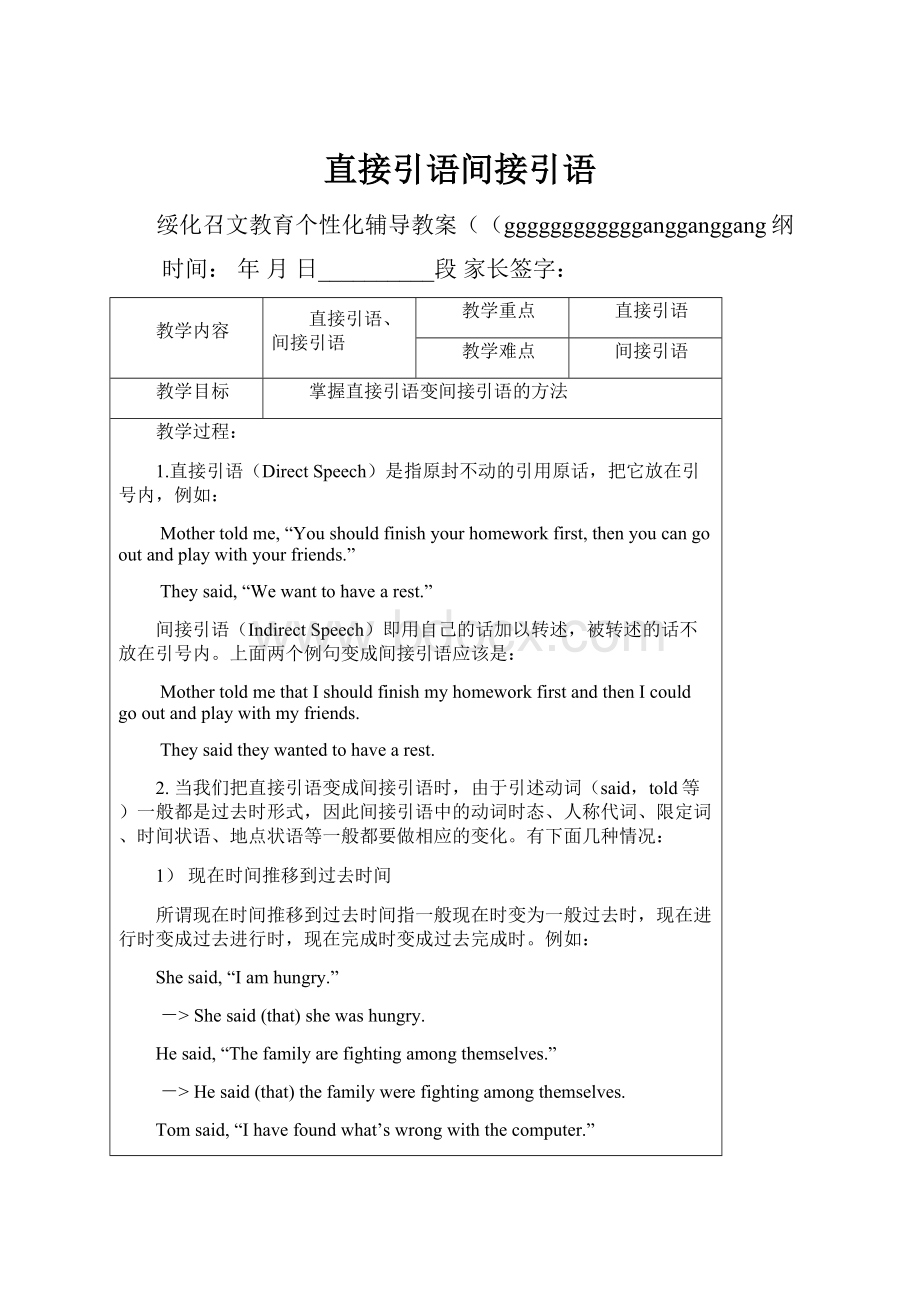直接引语间接引语.docx
《直接引语间接引语.docx》由会员分享,可在线阅读,更多相关《直接引语间接引语.docx(9页珍藏版)》请在冰豆网上搜索。

直接引语间接引语
绥化召文教育个性化辅导教案((ggggggggggggangganggang纲
时间:
年月日__________段家长签字:
教学内容
直接引语、间接引语
教学重点
直接引语
教学难点
间接引语
教学目标
掌握直接引语变间接引语的方法
教学过程:
1.直接引语(DirectSpeech)是指原封不动的引用原话,把它放在引号内,例如:
Mothertoldme,“Youshouldfinishyourhomeworkfirst,thenyoucangooutandplaywithyourfriends.”
Theysaid,“Wewanttohavearest.”
间接引语(IndirectSpeech)即用自己的话加以转述,被转述的话不放在引号内。
上面两个例句变成间接引语应该是:
MothertoldmethatIshouldfinishmyhomeworkfirstandthenIcouldgooutandplaywithmyfriends.
Theysaidtheywantedtohavearest.
2.当我们把直接引语变成间接引语时,由于引述动词(said,told等)一般都是过去时形式,因此间接引语中的动词时态、人称代词、限定词、时间状语、地点状语等一般都要做相应的变化。
有下面几种情况:
1)现在时间推移到过去时间
所谓现在时间推移到过去时间指一般现在时变为一般过去时,现在进行时变成过去进行时,现在完成时变成过去完成时。
例如:
Shesaid,“Iamhungry.”
->Shesaid(that)shewashungry.
Hesaid,“Thefamilyarefightingamongthemselves.”
->Hesaid(that)thefamilywerefightingamongthemselves.
Tomsaid,“Ihavefoundwhat’swrongwiththecomputer.”
->Tomsaidhehadfoundwhatwaswrongwiththecomputer.
在下列场合,尽管陈述动词为过去时形式,间接引语中的动词时态却不必改变,即:
a)当引述的是客观事实、科学真理、现在习惯工作以及格言等内容时:
Hesaid,“Theword‘laser’isanacronym(首字母缩略词).”
->Hesaidtheword‘laser’isanacronym.
b)当动词所表示的状态或动作在引述时仍在继续时:
“I’mforty,”hesaid.
->Hesaidheisforty.
c)当谓语动词包含无过去时形式的情态助动词时:
Hesaid,“Itmustbeprettylate.Ireallymustgo.”
->Hesaiditmustbeprettylate,andhereallymustgo.
Hesaid,“Youmustn’tsmokeintheroom.”
->HesaidImustn’tsmokeintheroom.
2)过去时间推移到过去的过去
这里需要注意以下几点:
a)当强调动作或状态先于引述动词时,一般过去时要变成过去完成体。
例如:
Hesaid,“Ididn’tknowyou.”
->Hesaidhehadn’tknownme.
当“过去的过去”已经不言自明,或者通过其他词汇手段予以体现,或者侧重于强调所转述的事实本身时,一般过去时形式可以不变。
例如:
Annsaid,“Shewasbornin1981.”
->Annsaidshewasbornin1981.
b)过去进行时可以变成过去完成进行时,也可以不变。
例如:
Robertsaid,“IwasjokingwithMary.”
->RobertsaidhehadbeenjokingwithMary.
RobertsaidhewasjokingwithMary.
c)过去完成时仍为过去完成时,不需改变。
例如:
Hesaid,“Wehadn’treturnedtothestorewhenshecame.”
->Hesaidtheyhadn’treturnedtothestorewhenshecame.
d)时间状语分句中的一般过去式或者过去进行时可以不变。
例如:
Johnsaid,“WhenIlivedinLondonIoftensawJane.”
->JohnsaidwhenhelivedinLondonhehadoftenseenJane.
JohnsaidwhenhelivedinLondonheoftensawJane.
3)将来时间推移到过去将来时间
最常见的是把表示将来时间的助动词由现在时形式变为过去时形式。
例如:
Hesaid,“We’respendingnextweekendathome.”
->Hesaidtheywerespendingthenextweekendathome.
Shesaid,“Themilkwillgooff(变质)ifyoudon’tdrinkittoday.”
->ShesaidthemilkwouldgooffifIdidn’tdrinkitthatday.
Theysaid,“We’regoingtoHawaiithissummervacation.”
->TheysaidtheyweregoingtoHawaiithatsummervacation.
但是,在引述时,如果原话中的动作或者状态属于尚未到来的将来时间,那么,可以不推移到过去将来时间。
例如:
Hesaid,“I’llbewaitingforyoutomorrow.”
->Hesaidhewillbewaitingformetomorrow.
4)人称代词、限定词、时间状语、地点状语的变化
由上面的例子可以看出,当直接引语变成间接引语时,除动词时态变化外,人称代词、限定词、时间状语、地点状语等通常也作相应的变化。
a)人称代词,除引述本人原话外,通常第一、二人称变为第三人称,或者第二人称变为第一人称;限定词也作相应的变化。
例如:
Hesaid,“Weloveourcountry.”
->Hesaidtheylovetheircounty.
b)指示代词this,these分别变成that/it,those/they或them;指示限定词this,those通常变为that,those或the。
例如:
“Thishouseisveryexpensive,”shesaid.
->Shesaidthathousewasveryexpensive.
Thechildrencamebackwithtwowalletsandsaid,“Wepickedtheseuponthepavement.”
->Thechildrencamebackwithtwowalletsandsaidtheyhadpickedthemuponthepavement.
c)时间状语在间接引语中的变化有三种情况:
i)时间状语和动词时态两者都变。
例如:
Hesaid,“Itwascompletesayearago.”
->Hesaidithadbeencompletedayearbefore.
ii)时间状语不变,动词时态可变可不变。
例如:
Shesaid,“WeleftParisat8a.m.”
->ShesaidtheyhadleftParisat8a.m.
ShesaidtheyleftParisat8a.m.
iii)时间状语变与不变需视具体情况而定,如果引述时间和说话时间(如同一年、同一月、同一天等),时间状语可不变。
例如:
Mr.Blacksaid,“WestartedlearningChineselastmonth.”
->Mr.BlacksaidtheyhadstartedlearningChineselastmonth.(同一月引述)
->Mr.BlacksaidtheyhadstartedlearningChinesethepreviousmonth.(可在同一月引述,也可不在同一月引述)
直接引语间接引语
todaythatday
thismorning/afternoon,etc.thatmorning/afternoon,etc.
yesterdaythedaybefore,thepreviousday
(the)daybeforeyesterdaytwodaysbefore
tomorrowthenextday,thefollowingday
(the)dayaftertomorrowtwodaysafter,intwodays’time
nextweek/month,etc.thenextweek/month,etc.
lastweek/monththeweek/monthbefore
nowthen
d)地点状语here通常变为there;但若说话人所在地也就是引述人所在地,可仍用here,也可用具体地点代替here。
例如:
Shesaid,“Ifirstmetyourbrotherhere.”
->Shesaidshefirstmetmybrotherthere.
“Arethechildrenhere?
”Fatherasked.
->Fatheraskedwhetherthechildrenwerehere.
本单元重点:
直接引语和间接引语,需要注意的是:
直接引语变间接引语时,人称和时态要发生变化,时态得和主句的时态保持一致。
Sentencesfromthepassage(重点句讲解)
Iaskedherwhyshewantedtodothat,andshesaidthatshehadforgottentodohers.
我问她为什么要那么做,她说她忘记做作业了。
forgettodosth.忘记做某事(还没有做)
forgetdoingsth.忘记做过某事(已经做过了)
e.g.Whenyouleavetheclassroom,don’tforgettoturnoffthelights.
离开教室时,别忘记关灯。
Iforgotmeetinghimbefore.我不记得以前见过他了。
类似的还有:
remembertodosth.记得做某事(还没有做)
rememberdoingsth.记得做过某事(已经做过了)
e.g.
“Remembertofinishyourhomeworkontime,LiMing”,hismothersaid.
李明妈妈说,“记得按时完成作业。
”
Iremembertellingthisstoryforseveraltimes.
我记得这个故事给你讲过好几次了。
◆IsaidIdidn’tthinkitwasagoodideaforhertocopymyhomework.
我说,抄我的作业并不是什么好事。
注意的think用法:
如果think引导的宾语从句,其从句表示否定意思时,不是否定从句,而是否定主句。
e.g.翻译下列句子:
我认为给你父亲说这件事的时机还不成熟。
Idon’tthinkitistherighttimeforyoutotellyourfatheraboutthat.
我认为他不是一个好演员。
Idon’tthinkheisagoodactor.
我认为你说的并不正确。
Idon’tthinkyouareright.
◆Yesterdayshetoldmeshewassorryshe’dgottenmad.
昨天她告诉我,她为自己当时生气而抱歉。
◆Nowadays,manystudentspreferusingEnglishnamesinalanguageclassroom.
如今,许多学生喜欢在上语言课的时候用英文名字。
prefer的用法:
preferv.更喜欢;宁愿
prefersth.tosth.喜欢…胜过…
preferdoingsth.todoingsth.喜欢…而不喜欢…
prefertodoratherthando宁愿…而不愿…
e.g.
Doyouprefercoffeeortea?
你喜欢咖啡还是茶?
Hepreferstalkingtodoing.他喜欢说,却不喜欢做。
Theyprefertodieratherthansurrender.他们宁死不屈。
◆Andforyoungpeople,havinganEnglishnameiscoolforthemwhentheytalktotheirforeignpenpals.
而且对年轻人来说,有了英文名字,和笔友交谈时也很酷。
havinganEnglishname…中having是动词ing形式,用来做主语。
e.g.
Gettingupearlyeverydayishisgoodhabit.每天早起是他的习惯。
Swimmingisherfavoritesport.游泳是她最喜欢的运动。
◆LearningEnglishandhavingEnglishnamesarebothpopularinChina.TheyarealsoimportantforChina’scontactwiththeworld.
学习英语,而且有英文名字在中国很流行。
这些对中国和世界的接触也很重要。
◆Ontheotherhand,somepeoplewhocometoChinachooseChinesenames
另一方面,一些人来到中国,也起了中文名字。
ontheonehand一方面…
ontheotherhand另一方面…
e.g.Ononehand,heisacleverboy;ontheotherhand,healwaysmakeshismotherangry.
一方面,他是个聪明的孩子;可另一方面,他老惹母亲生气。
练习题:
一、将直接引语变成间接引语
1.Theplumbersaid,“Ican’tfixthebathtubtodaybecauseI’msick”
2.Grandmasaid,“Grandpaisfeelingmuchbettertoday.”
3.Mr.andMrs.Davissaid,“Wewon’tbeabletocometodinnerthisSaturdaynight.”
4、Thelandlordsaid,“Ihaven’treceivedthismonth’srentyet.”
5.CousinSuesaid,“I’msorryIdidn’thavetimetocomeoverandvisitlastSaturday.”
6.UncleHarrysaid,“I’llcallbacklater.”
7.Theneighborsacrossthestreetsaid,“Wewererobbedlastnight!
”
8.Sallysaid,“I’matmyfriendJuliet’shousenow.”
9.Mothersaid,“Yoursisterandbrother-in-lawaregoingtohaveababy.”
10.Auntysaid,“Therewasabigfireatthehighschool.”
将所给直接引语变为间接引语,每空一词:
1.“Inevereatmeat.”hesaid.
Hesaidthat______never______meat.
2.“I’vefoundmywallet.”hesaidtome.
He______methathe__________________wallet.
3.“Itookithomewithme.”shesaid.
Shesaidthat___________________ithomewithher.
4.Theteachersaid,“Thesunrisesintheeastandgoesdowninthewest.”
Theteachersaidthatthesun______intheeastand______downinthewest.
5.“Imetheryesterday.”hesaidtome.
He______methathe______mettheday______.
6.“Youmustcomeherebeforefive.”hesaid.
HesaidthatI______togo______beforefive.
7.“Iboughtthehouse10yearsago.”hesaid.
Hesaidthathe_______boughtthehouse10years_______.
8.“Didyouseeherlastweek?
”hesaid.
He____________Ihadseenhertheweek_______.
9.Hesaid,“Youcansithere,Jim.”
He______Jimthathe______sitthere
10.Heasked,“Howdidyoufindit,mother?
”
Heaskedhermother__________________foundit.
11.“Wherehaveyoubeenthesedays?
”heasked.
Heaskedme_____________________been_______days.
12.“Doyouknowwhereshelives?
”heasked.
Heasked____________knewwhereshe______.
13.“Stopmakingsomuchnoise,children.”hesaid.
He______thechildren____________makingsomuchnoise.
14.“Don’ttellhimthenews.”shesaid.
Shetoldme___________________himthenews.
15.“Areyouintestedinthis?
”hesaid.
He____________Iwasinterestdin______.
巩固练习:
1、Shesaid,"Ihavetosaygoodbyenow."
2、Shesaidtous,"Itmaysnowtonight."
3、"Iboughttheglassesyesterday,"Shesaidtome.
4、"Isyourmotheradoctor?
"SheaskedLily.
5、Sheasked"WhereisLinda?
"
6、"Whohasbroughtyoutothehospital?
"thenurseaskedthegirl.
7、"Pleasereadtenpagestoday,"theteachersaidtothestudents.
8、Theteachersaidtous,"Theearthtravelsaroundthesun."
9、Hesaid,"Iwasasoldierin2008."(注意此题)
二、本次课后作业:
三、学生对于本次课的评价:
学生评价:
○差○一般○满意○特别满意
学生签字:
四、教师评定:
1、学生上次作业评价:
○好○较好○一般○差
2、学生本次上课情况评价:
○好○较好○一般○差
教师签字:
召文学校